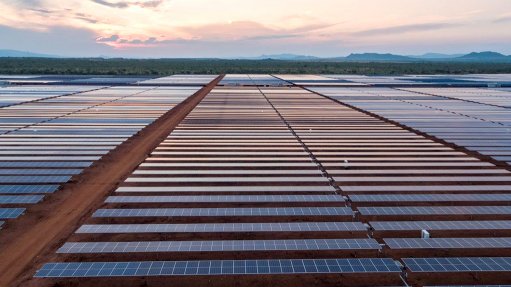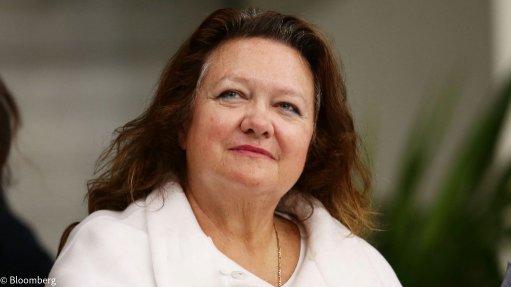Juukan Gorge commitee recommends legislative changes
PERTH (miningweekly.com) – A final report by the Australian Parliament’s Northern Australia Committee has highlighted the need for legislative change at Commonwealth, state and territory levels to ensure the protection of Aboriginal and Torres Strait Islander heritage.
In its final report of its inquiry into the destruction of the Juukan Gorge rockshelters in the Pilbara, by mining major Rio Tinto in 2019, the Northern Australia Committee noted that what happened at Juukan Gorge is not unique.
Upon tabling the final report, Committee chairperson Warren Entsch said the destruction of the caves was a disaster beyond reckoning for the Puutu Kunti Kurrama People and Pinikura people, and Aboriginal and Torres Strait Islander cultural heritage as a whole.
“This disaster was a wakeup call that there are serious deficiencies in the protection of Aboriginal and Torres Strait Islander cultural heritage. What is needed now is a way forward, for both Aboriginal and Torres Strait Islander people and industry.”
During the inquiry, the Committee heard a great number of Aboriginal and Torres Strait Islander cultural heritage protection issues. Each incident of heritage destruction or threat that was discussed compounded the clear need for change.
Entsch said that from the significant volume of evidence received by the Committee, it was clear that extensive changes were required to ensure the protection of Aboriginal and Torres Strait Islander peoples cultural heritage.
“Aboriginal and Torres Strait Islander people have been let down by the Commonwealth, state and territory governments as well as industry. In making these recommendations, the Committee and I want to bring about meaningful change. Failures to protect Aboriginal and Torres Strait Islander heritage must stop here.”
The report makes eight recommendations focusing on legislative change that will enhance Aboriginal and Torres Strait Islander people’s cultural heritage protections.
Among other things, the Committee found that there was a need for an overarching Commonwealth legislative framework which should be developed through a process of co-design with Aboriginal and Torres Strait Islander peoples.
The report also recommended that administration responsibility of the Aboriginal and Torres Strait Islander Heritage Protection Act and the Environmental Protection and Biodiversity Conservation Act should be transferred to the Minister for Indigenous Australians, and that there should be an Australian government review of the existing Native Title Act.
Furthermore, the report recommended that the Australian government should endorse and commit to implementing Dhawura Ngilan: A vision for Aboriginal and Torres Strait Islander Heritage in Australia, and that there was a need for the development of a model for cultural heritage truth-telling and to establish an independent fund to administer funding of prescribed body corporates under the Native Title Act.
Rio Tinto has welcomed the final report, with CEO Jakob Stausholm saying the company has been working hard to rebuild trust and meaningful relationships with the Puutu Kunti Kurrama and Pinikura (PKKP) people and other Traditional Owners.
“Rio Tinto is absolutely committed to listening, learning and showing greater care, and this remains a top priority.
“We know this will take time and there will be challenges ahead, but we are focused on improving our engagement with Indigenous Peoples and our host communities to better understand their priorities and concerns, minimise our impacts, and responsibly manage Indigenous cultural heritage in and around our operations.”
Following a review of the company’s cultural heritage management in August of last year, the miner introduced several changes to ensure heritage sites of exceptional significance, like the Juukan Gorge rock shelters, are protected and preserved.
Rio has also worked to address the recommendations made in the Committee’s interim report in December 2020 that weren’t addressed in the board’s recommendations.
As well as its overhaul of cultural heritage management and work to rebuild relationships with Traditional Owners, Rio is working to drive cultural change at every level of the business, including steps to grow Indigenous leadership, with A$50-million invested to retain, attract and grow Indigenous professionals and leaders in Rio’s Australian business.
In Australia, all frontline Rio staff are undertaking cultural awareness training, with face-to-face training or e-learning with Indigenous Australians.
Industry bodies have also been quick to respond to the Committee report, with the Association of Mining and Exploration Companies (Amec) saying it would carefully review the report and the recommendations made therein.
“The destruction of the 46 000-year-old caves at Juukan was, and is, a deeply saddening and regrettable event that destroyed a site of enormous cultural and heritage significance for Australia,” said Amec CEO Warren Pearce.
“Over the last year-and-a-half, Amec member companies have reviewed their own practices and re-engaged with traditional owners and aboriginal communities. We are working hard to ensure the highest standards are being met with Aboriginal Cultural Heritage, and to rebuild trust and confidence with traditional owners.
“The events at Juukan Gorge, and this Inquiry, have rightly forced mining and mineral exploration companies to reflect on the processes, agreements and relationships that we have with traditional owners and Aboriginal peoples, to ensure such a tragedy can never occur again,” said Pearce.
The Chamber of Minerals and Energy of Western Australia (CME) has also said it would consider the recommendations made, but has warned on the introduction of new legislation.
“The complexity of the issues examined in this national inquiry are reflected in the detail of the recommendations that are part of this report,” CME director of policy and advocacy Rob Carruthers said.
“While our sector is always open to ways in which we can improve what we do, CME and its member companies are steadfast in the view that any proposal to strengthen federal oversight on Aboriginal heritage matters would not deliver improvements and would only duplicate processes and relationships that are best delivered at a local level with local stakeholders.
“We remain committed to supporting the passage of Western Australia’s Aboriginal cultural heritage legislation as an absolute priority and in turn for the State to facilitate local Custodians having their say on protection of their cultural heritage.”
Carruthers highlighted the three phases of consultation towards the legislation undertaken by the Western Australian government since 2017, including a period of extended consultation since the release of a draft Bill in October 2020.
“Industry in Western Australia hasn’t just waited for new legislation, we’ve used this time to take action," Carruthers said.
"This has included actions such as reviewing existing heritage approvals, cultural heritage management plans and Native Title agreements to incorporate contemporary Aboriginal custodian views, reflect new information and better protect heritage values.
“We remain hopeful that this critical legislation will be introduced into Western Australian Parliament in 2021, marking a major milestone in the modernisation of Western Australia’s Aboriginal cultural heritage regime.
“Introduction of this legislation into Western Australian Parliament will allow stakeholders to begin the process of co-designing supporting regulations and guidance which reflect a modern, practical and balanced approach.
“By extension, the resourcing and capacity building of PBCs to engage fully in a new regime will be critical to its success, and we welcome the government announcement of an initial A$10-million in funding to kickstart this process.
“The government understands how important this legislation is for the next phase of development and industry in Western Australia and to ensure better outcomes for Aboriginal people.
“Formalisation of consultation and agreement-making on cultural heritage management will enshrine the priorities of local Custodians in ongoing project development.”
Carruthers said strengthening relationships between mining and resources operators and Traditional Owners was incredibly important.
“Mining has occurred in the Pilbara for more than six decades, and in the Goldfields for double that timeframe,” Carruthers said.
“We acknowledge that we haven’t always gotten things right, at times with deeply regrettable consequences. Our commitment remains to invest in long-term relationships for mutual benefit, and we must continue to work hard to build open dialogue and respond to the priorities of our Indigenous partners.
“Traditional Owners and Custodians continue to make an important contribution to the economic prosperity of all Australians by enabling mining on their lands, and the resources sector takes the responsibility of these partnerships extremely seriously.”
Comments
Press Office
Announcements
What's On
Subscribe to improve your user experience...
Option 1 (equivalent of R125 a month):
Receive a weekly copy of Creamer Media's Engineering News & Mining Weekly magazine
(print copy for those in South Africa and e-magazine for those outside of South Africa)
Receive daily email newsletters
Access to full search results
Access archive of magazine back copies
Access to Projects in Progress
Access to ONE Research Report of your choice in PDF format
Option 2 (equivalent of R375 a month):
All benefits from Option 1
PLUS
Access to Creamer Media's Research Channel Africa for ALL Research Reports, in PDF format, on various industrial and mining sectors
including Electricity; Water; Energy Transition; Hydrogen; Roads, Rail and Ports; Coal; Gold; Platinum; Battery Metals; etc.
Already a subscriber?
Forgotten your password?
Receive weekly copy of Creamer Media's Engineering News & Mining Weekly magazine (print copy for those in South Africa and e-magazine for those outside of South Africa)
➕
Recieve daily email newsletters
➕
Access to full search results
➕
Access archive of magazine back copies
➕
Access to Projects in Progress
➕
Access to ONE Research Report of your choice in PDF format
RESEARCH CHANNEL AFRICA
R4500 (equivalent of R375 a month)
SUBSCRIBEAll benefits from Option 1
➕
Access to Creamer Media's Research Channel Africa for ALL Research Reports on various industrial and mining sectors, in PDF format, including on:
Electricity
➕
Water
➕
Energy Transition
➕
Hydrogen
➕
Roads, Rail and Ports
➕
Coal
➕
Gold
➕
Platinum
➕
Battery Metals
➕
etc.
Receive all benefits from Option 1 or Option 2 delivered to numerous people at your company
➕
Multiple User names and Passwords for simultaneous log-ins
➕
Intranet integration access to all in your organisation


















